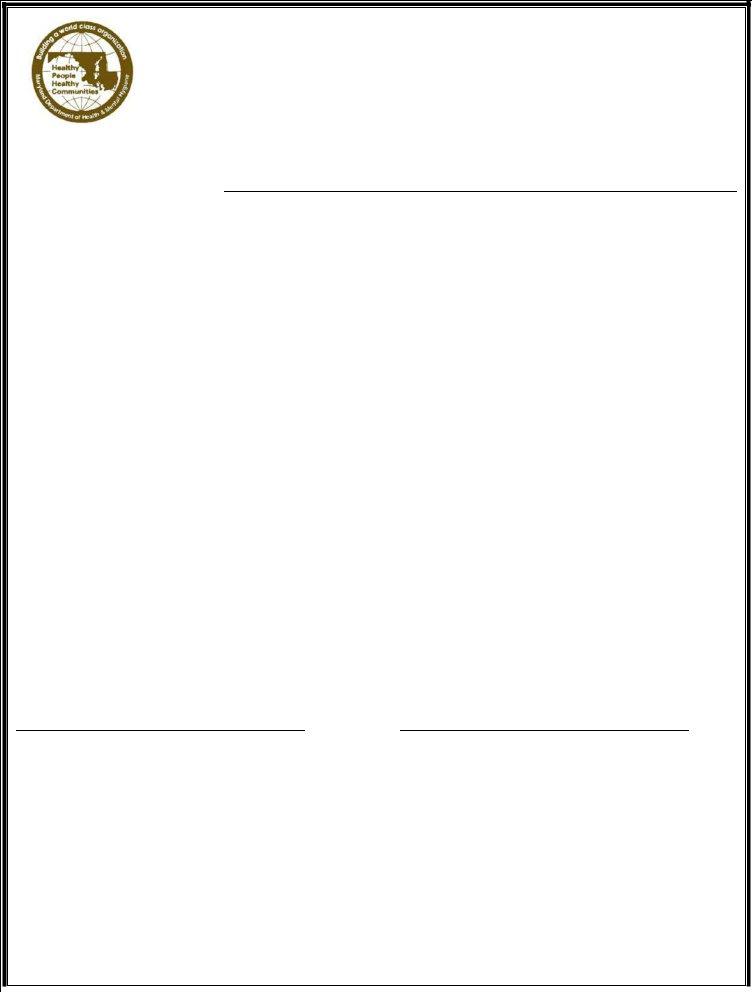The Maryland Admission Form represents a crucial aspect of the state’s commitment to the mental health and well-being of its residents. Crafted by the Department of Health and Mental Hygiene's Behavioral Health Administration in Catonsville, MD, this form is designed to streamline the process of voluntary admission into mental health facilities for individuals seeking care or treatment for mental disorders. It lays out a clear procedure in accordance with the specifications of Health-General Article, §10-609, Annotated Code of Maryland. Applicants must provide personal information, affirm their understanding of their request, and acknowledge their rights and responsibilities related to voluntary admission. Additionally, the requirement for a physician’s or psychologist’s endorsement ensures that only individuals who meet specific health criteria – including the presence of a mental disorder susceptible to treatment, comprehension of the nature of their admission request, and the capability to give continuous assent to retention and to request release – are admitted. This form not only facilitates a streamlined entry process but also upholds the legal rights of applicants, emphasizing informed consent and voluntary participation. Moreover, it aligns with federal and state non-discrimination policies, underscoring the Department's commitment to providing equitable access to mental health services. The form also reflects nuances such as special considerations for older individuals, highlighting the Maryland health system's comprehensive approach to mental health care. Through this meticulous process, Maryland reaffirms its dedication to supporting individuals in their journey towards mental wellness, ensuring that care is both accessible and adherent to the highest standards of medical and legal integrity.
| Question | Answer |
|---|---|
| Form Name | Maryland Form Admission |
| Form Length | 2 pages |
| Fillable? | No |
| Fillable fields | 0 |
| Avg. time to fill out | 30 sec |
| Other names | form voluntary admission, maryland voluntary admission, dhmh application voluntary admission, maryland voluntary admission pdf |

State of Maryland – Department of Health and Mental Hygiene
BEHAVIORAL HEALTH ADMINISTRATION
Catonsville, MD 21228
APPLICATION FOR VOLUNTARY ADMISSION
To the Administrative Head of:
Name of Facility
I hereby apply for voluntary admission to your facility for the care or treatment of a mental disorder pursuant to the provisions of
_________________________________________________ |
_____________________________________________ |
|||
|
Printed Name of Applicant |
|
Signature of Applicant |
|
_________________________________________________ |
_____________________________________________ |
|||
|
Address |
|
Date of Birth |
|
__________________________________________________ |
_____________________________________________ |
|||
|
Telephone Number |
|
Date |
Time |
|
PHYSICIAN’S OR PSYCHOLOGIST’S ENDORSEMENT |
|
||
I have examined |
|
|
, and I find that: |
|
The individual has a mental disorder;
The mental disorder is susceptible to care or treatment;
The individual understands the nature of the request for treatment;
The individual is able to give continuous assent to retention by the facility; and
The individual is able to ask for release.
I certify that I am duly licensed to practice medicine in the State of Maryland, pursuant to the Health Occupations Article,
I certify that I am licensed under the Health Occupations Article, Title 18, Annotated Code of Maryland, to practice psychology in the State of Maryland.
Printed Name of Physician or Psychologist |
|
Signature of Physician or Psychologist |
||
|
|
|
|
|
Address |
|
Phone Number |
Date |
Time |
The services and programs of the Department of Health and Mental Hygiene are provided on a
Application for Voluntary Admission must be on this form
|
DHMH #4 (Revised September 2, 2014) |
1 of 2 |
|
|
|
|
|

(a)In general. — Application for voluntary admission of an individual to a facility may be made under this section by the individual, if the individual is 16 years old or older.
(b)Application. — The applicant shall:
(1)Submit a formal, written application that contains the personal information and is on the form required by the Administration; or
(2)Informally request admission.
(c)Admission limitations — In general. — A facility may not admit an individual under this section unless:
(1)The individual has a mental disorder;
(2)The mental disorder is susceptible to care or treatment;
(3)The individual understands the nature of the request for admission;
(4)The individual is able to give continuous assent to retention by the facility; and
(5)The individual is able to ask for release.
(d)Admission limitations — Individuals 65 or older. — (1) In addition to the limitations in subsection (c) of this section, a State facility may not admit an individual who is 65 years old or older unless a geriatric evaluation team determines that there is no available, less restrictive form of care or treatment that is adequate for the needs of the individual.
(2)If admission is denied because of the determination of the geriatric evaluation team, the team shall;
(i)Inform the individual; and
(ii)Help the individual obtain the less restrictive form of care or treatment that the geriatric evaluation team finds would be adequate for the needs of the individual.
(a)Informal request. — An individual who is admitted voluntarily to a facility, on an informal request, may leave the facility at any time between 9 a.m. and 4 p.m., unless the admission status of the individual has been changed to an involuntary admission.
(b)Formal applications — An individual who has been admitted voluntarily, under a formal written application, may not be held for more than 3 days after the individual asks for release, unless the admission status of the individual has been changed to an involuntary admission.
(c)Formal applications — Minors. — A minor who has been admitted voluntarily, on the application of a parent or guardian of the minor, may not be held for more than 3 days after the applicant for the admission asks for release, unless the admission status of the minor has been changed to an involuntary admission.
|
DHMH #4 (Revised September 2, 2014) |
2 of 2 |
|
|
|
|
|